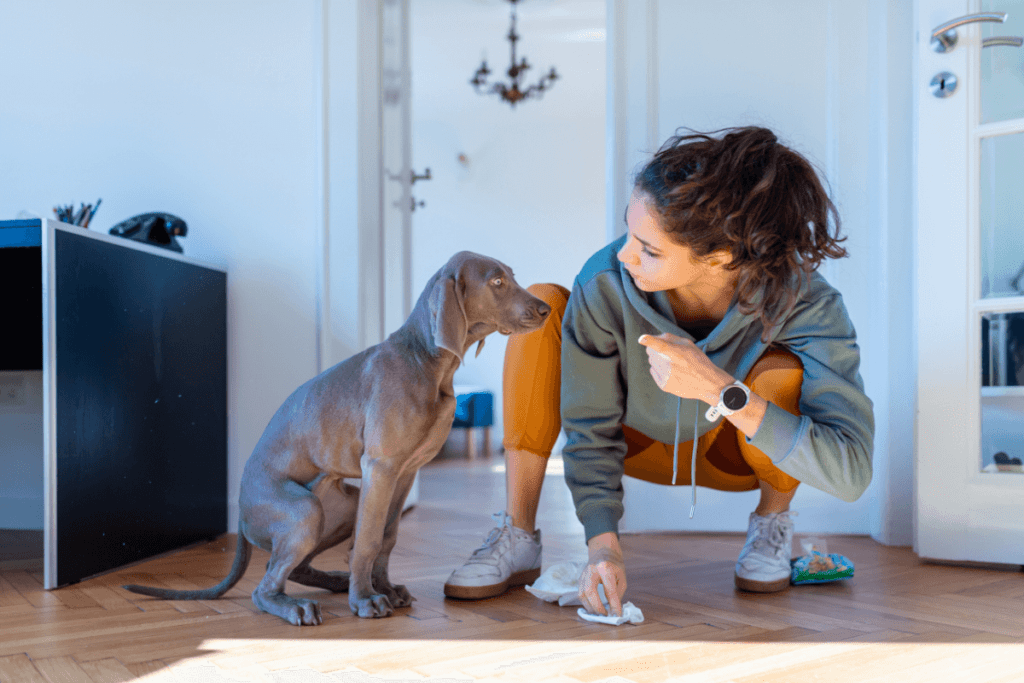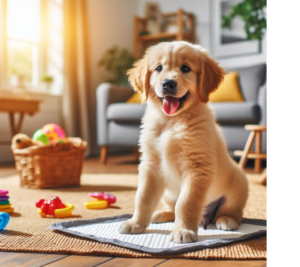Potty training a 14-week-old puppy in an apartment
A Complete Guide
Potty training a 14-week-old puppy in an apartment requires patience, consistency, and a well-structured routine. Whether you are using puppy pad, a crate, or taking your pup outside frequently, following a set schedule will help reinforce good bathroom habits. In this guide, we’ll cover essential potty training tips, a schedule to follow, and solutions to common challenges.
Establishing a Potty Training Routine
A structured routine is crucial for potty training success. Puppies thrive on consistency, and following a set schedule will help them understand when and where they should go to the bathroom.
Here are the key times your puppy should be taken outside:
| Time | Activity | Notes |
|---|---|---|
| 6:00 AM | First potty break of the day | Take your puppy outside as soon as they wake up. |
| 7:00 AM | After breakfast potty break | Puppies usually need to go shortly after eating. |
| 9:00 AM | Mid-morning potty break | Helps prevent accidents during active playtime. |
| 12:00 PM | After lunch potty break | Puppies often need to go right after meals. |
| 2:00 PM | Mid-afternoon potty break | Helps reinforce routine and prevent accidents. |
| 5:00 PM | After dinner potty break | Always take them outside after eating. |
| 7:00 PM | Evening potty break | Ensures they relieve themselves before bedtime preparation. |
| 9:30 PM | Final potty break before bed | Helps them sleep through the night accident-free. |
| Midnight (if needed) | Optional overnight potty break | Some younger puppies may need a break during the night. |
1. First Thing in the Morning
As soon as you wake up, take your puppy out of their crate or playpen and head straight to the designated potty area. Avoid distractions such as checking your phone or making coffee. Puppies have limited bladder control at this age, so immediate action is necessary.Potty training a 14-week-old puppy in an apartment. Reward them with a small treat, like a piece of cheese, for successful potty breaks.
2. After Meals
Feeding your puppy at the same times every day helps regulate their elimination schedule. Typically, puppies need to relieve themselves within 5 to 30 minutes after eating. Watch for signs like sniffing or circling, which indicate they need to go out. Offering a small cheese treat as a reward can reinforce good behavior.
3. After Naps and Playtime
Puppies often need to relieve themselves after a nap or an active play session. Pay attention to subtle cues such as wandering away, whining, or becoming overly excited. Potty training a 14-week-old puppy in an apartment.Taking your pup out immediately after these activities reduces the chance of accidents. A small piece of cheese as a treat can be a great incentive for successful potty training.
4. Before Bedtime
Always take your puppy outside for one last potty break before bedtime. Most 14-week-old puppies can sleep through the night without an accident, but reducing their water intake two hours before bedtime can help prevent nighttime accidents.
Using a Crate or Playpen for Potty Training Puppy Apartment 14 Weeks Old
Crates and playpens are useful tools for potty training in an apartment. Here’s how to use them effectively:
Crate Training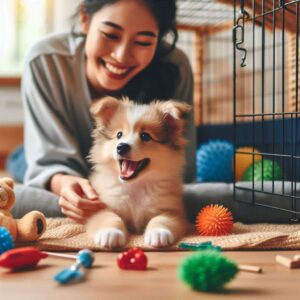
- A crate provides a safe and comfortable space for your puppy.
- Puppies naturally avoid soiling their sleeping area, which encourages bladder control.
- Follow the “month-plus-one” rule: A 14-week-old puppy (3.5 months) can hold their bladder for about 4.5 hours.
- Reward successful crate potty breaks with a cheese treat.
Playpen Training
- A playpen with puppy pads can be a good alternative if you can’t take your puppy outside frequently.
- Limit the playpen space to encourage your pup to use the pads rather than random areas.
- Gradually reduce the use of pads as your puppy learns to wait until outdoor potty breaks.
- Small cheese rewards can help reinforce using the correct potty spot.
Recognizing Potty Signals in a 14-Week-Old Puppy
Understanding when your puppy needs to go is key to preventing accidents. Common potty signals include:
- Sniffing around or circling
- Whining or barking
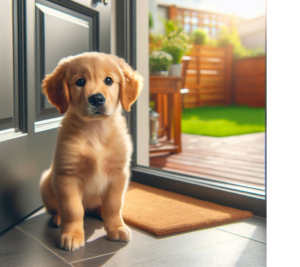
- Pacing or suddenly stopping play
- Running to the door
If you notice these signs, take your puppy outside immediately and reward them with a small piece of cheese for going in the right spot.
Handling Accidents the Right Way
Accidents are a normal part of the training process. If your puppy has an accident:
- Do not punish them. Instead, interrupt them gently with an “uh-oh” sound and take them outside immediately.
- Clean the area thoroughly with an enzymatic cleaner to remove odors and prevent repeat accidents.
- Stay patient—potty training takes time and reinforcement.
- When they do go in the right place, give them positive reinforcement and a cheese reward.
Transitioning to More Freedom
At 14 weeks old, puppies are still learning bladder control. To give your puppy more supervised freedom:
- Allow short periods (20-30 minutes) of supervised play outside the crate or playpen after successful potty breaks.
- Gradually increase freedom as your puppy demonstrates reliability.
- If accidents occur, reduce the amount of unsupervised time and reinforce the routine.
Should You Crate During the Day?
If you work from home, you might wonder whether to use a crate or a playpen during the day. A crate helps teach bladder control, but prolonged crating can feel restrictive. Potty training a 14-week-old puppy in an apartment.A combination of crate and playpen time, along with regular potty breaks, offers a balanced approach.
Final Thoughts on Potty Training Puppy Apartment 14 Weeks Old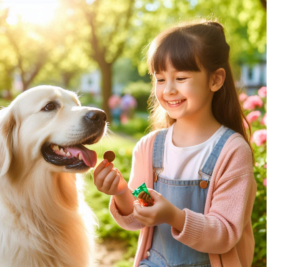
Potty training a 14-week-old puppy in an apartment requires dedication and a consistent schedule. With positive reinforcement, patience, and structured training methods, your puppy will develop good habits. Stay vigilant, celebrate successes, and adapt the routine as needed. Offering small cheese treats as rewards can make training more effective and enjoyable for your pup.
